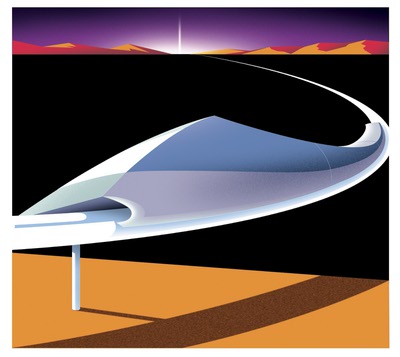Sunday, Dec. 6, 2009 | 9:07 a.m.
Sun Archives
- Shanghai’s maglev: Flying with both feet on the ground (11-13-2009)
- Backers of less traditional high-speed projects air plans (10-20-2009)
- Analysts aboard for rail hub (10-8-2009)
- Millions for maglev: So, where’s the money? (9-24-2009)
- Transportation secretary: Gibbons 'not accurate' in noting maglev earmark (9-23-2009)
- Maglev money sparks a Gibbons-Reid quarrel (9-18-2009)
- High-speed rail competition heats up with new funding (9-16-2009)
- Beyond Victorville: Coloradans covet high-speed rail, too (9-14-2009)
- DesertXpress train aiming for March construction start (9-1-2009)
- Forum to address DesertXpress train proposal (6-28-2009)
- High-speed train plan gets notice in D.C. (6-24-2009)
Sun Coverage
Organizations that have worked to educate Southern Nevadans about various high-speed rail systems want to build a research and development center and proving grounds in North Las Vegas that could show transit systems in action side by side.
Representatives of UNLV’s Transportation Research Center and the Ward 5 Chamber of Commerce have approached the Nevada System of Higher Education and the City of North Las Vegas about developing a high-speed rail proving ground on public land north of the Bruce Woodbury Beltway.
The proposal comes as UNLV and the Ward 5 Chamber plan the organizations’ fourth high-speed rail forum Monday at UNLV’s Science and Engineering Building auditorium. Richard Lawless and Tsutomu Morimura, representatives of Japanese high-speed rail interests, will make presentations at the event beginning at 6 p.m.
Lawless is president and CEO of U.S.-Japan High-Speed Rail while Morimura represents the JR Central Railway Co., which operates Japan’s famed Shinkansen “bullet train.” The two speakers will take questions from the public and from a panel that includes two UNLV professors and Assemblyman Harvey Munford.
UNLV and the Ward 5 Chamber – which backs the rail forums because of the potential for future jobs – previously played host to forums by DesertXpress, a traditional high-speed rail project expected to begin construction on a Las Vegas-to-Southern California line next year; American Magline Group, which is working to develop a magnetic-levitation train between Las Vegas and Southern California; and three unconventional mass transportation systems.
The Central Japan Railway operates both conventional rail and maglev systems and is angling to sell Japanese technology to U.S. operators developing rail systems.
And that’s where the North Las Vegas research center and proving ground comes in.
Munford, Stan Washington, who heads GreenTech Nevada, a Ward 5 Chamber member, and Dr. Ken Peck of UNLV’s Transportation Research Center conferred with Nevada System of Higher Education officials and made a presentation last week to the North Las Vegas City Council.
Proving ground backers say Nevada could take the lead in positioning itself to be a neutral host to emerging high-speed rail proposals.
Developing a proving ground in Nevada would give rail technology developers an opportunity to test their products in a desert climate, the proposal’s backers say.
The proposal is in the early planning stages and cost estimates haven’t been reached.
Organizers envision the facility would be coordinated by UNLV, the University of Nevada, Reno, the College of Southern Nevada and the Desert Research Institute.
The group wants to develop the testing ground at a time when high-speed rail technology is rapidly changing and next-generation systems are being introduced. They also want to move quickly because President Obama says high-speed mass transportation is a priority for his administration.
Organizers say a test facility could create hundreds of jobs, help put Nevada in a leadership position for mass transportation research and boost the tourism industry because thousands of people would travel to Southern Nevada to see train systems demonstrated.
Two companies already have expressed interest in installing test tracks at a North Las Vegas facility if it is built.
Frank Randak, president of AVT SolaTrek, a car-shuttling freeway-decluttering mass transportation system using maglev technology, and Robert Pulliam, president of Texas-based Tubular Rail Inc., an unconventional rail system with vehicles that pass through a series of O-rings, said they would be interested in building test tracks if a center is developed.
SolaTrek and Tubular Rail made presentations at UNLV rail forums in October.


Join the Discussion:
Check this out for a full explanation of our conversion to the LiveFyre commenting system and instructions on how to sign up for an account.
Full comments policy